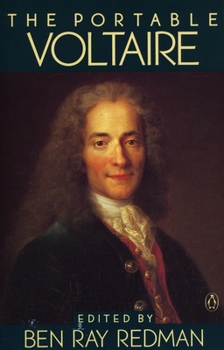The Portable Voltaire
Select Format
Select Condition 
Book Overview
Includes Part One of Candide ; three stories; selections from The Philosophical Dictionary, The Lisbon Earthquake , and other works; and thirty-five letters.
Format:Paperback
Language:English
ISBN:0140150412
ISBN13:9780140150414
Release Date:July 1977
Publisher:Penguin Publishing Group
Length:576 Pages
Weight:0.89 lbs.
Dimensions:1.1" x 5.0" x 7.8"
Age Range:18 years and up
Grade Range:Postsecondary and higher
Customer Reviews
5 ratings
Best Volume of the "Old sinner from the eighteenth century"
Published by Thriftbooks.com User , 19 years ago
The portable Voltaire is the best single volume representing all his works. You don't just get the finest short novel ever written (Candide), you get Zadig, Micromegas, selections from the Philisophical Dictionary, Letters from England, and more. This is the volume to get if you want to find out why that weird looking character was always smiling...
The crusher of infamy
Published by Thriftbooks.com User , 20 years ago
"The Portable Voltaire" is an excellent compendium of the major works of the man who became the most famous iconoclast of the French Enlightenment. One of the attractions of this particular volume is the introduction by Ben Ray Redman, who delivers with witty, flowing prose an extremely interesting short biography and a summary of the man's philosophy. Normally I don't bother to mention a book's introduction in a review, but Redman's is so good I make a notable exception. Voltaire was a man of contrasts. He was sickly and feeble but miraculously managed to extend his lifespan to eighty-four years, travel abroad, and survive in prison; he was made wealthy by various benefactors and seemed generally happy but could be very cynical and antagonistic in his writing; and most notoriously, he was a deist whose hatred of Christianity could make him appear to be an atheist. Most of what he hated about Christianity was the clergy--their hypocrisy, their adherence to practices he found absurd, their conceit that everything in the universe is made exclusively for man's consumption and amusement--and the superstition and fanaticism exhibited by the more extreme practitioners of the faith.Nowhere are his themes more vigorously pronounced than in the novella "Candide," his most famous achievement. Candide is a simpleminded, ingenuous young man who, under the influence of his tutor Dr. Pangloss, apparently a caricature of the German mathematician-philosopher Leibnitz, steadfastly continues to believe the world as designed is optimal, where everything happens for the ultimate best, even while an endless string of ridiculous circumstances sends him on a series of adventures searching for his lost lover Cunegonde and forces him to bear witness to a theater of war, brutality, murder, rape, chaos, catastrophes, and nonsense, the only wordly haven being the utopian city of gold El Dorado in the mountains of Peru.The other novella, "Zadig," is similar but paints a more optimistic picture of fate. Here, the Babylonian nobleman Zadig is a virtuous man whose every act of virtue brings him a new misfortune because of other people's avarice, jealousy, or foolishness, but who always succeeds because of his will and cleverness rather than divine justice. As in "Candide," its hero is cast into a world of picaresque adventure and fateful encounters, but he eventually meets a hermit who teaches him that evil events induce, in various and unintended ways, good acts in response. We live our lives and protect one another as well as we can, as though we could not rely on God to do so for us. In the "Philosophical Dictionary," of which this volume contains a portion, Voltaire selects some terms and concepts from philosophy, religion, and politics, and writes a mini-essay on each that expresses his thoughts on the subject. For example, under "tolerance" he fires off a powerful indictment of bigots and those who think they are superior to others; under "government" he observ
An excellent introduction
Published by Thriftbooks.com User , 23 years ago
This volume provides a wonderful introduction to the writings and thought of one of the great cynics of the ages. Voltaire exemplifies the age of reason in his questioning of both authority and the prevailing beliefs of his day. His writing as presented here is very accessable and this book can be picked up and opened to any selection and read with enjoyment. An excellent intro for the general reader.
Voltaire is God!!
Published by Thriftbooks.com User , 25 years ago
I had heard of Voltaire being one of the greatest critics, satirists and philosophers of the Age of Reason; Now I see why. He tore apart many of the myths religions used to justify promoting *their* religion as the right one while bashing those others. He points out that a religion claiming to be free of superstitions and claiming to be against the same is hypocritical if it still sees Satan as effecting in "bad" behavior and similar un-Christian things. He points out that there is no such thing as going against one's will; If one does, one is simply adhering to the demands of another will, a will to do something different, and hence going against will when given choice is impossible. Read this book; It will inspire, educate and enlighten you!
Very informative and extremely easy to read
Published by Thriftbooks.com User , 26 years ago
If you are thinking of learning about philosophy in general would recommend this book as a good introduction to the beliefs of the 18th century French movement. If you are interested in Voltaire I would tell you to read this book AND NO OTHER. I have flipped through and read parts of other books and a great many of the boring, extremely boring. This book, especially the short introduction, are extremely exciting and bring the beliefs of Voltaire into sharp clarity. It includes his Philosophical Dictionary, the Candide, and several of his essays and plays. It also has a history of his life and what happened to him due to his heretical views.






